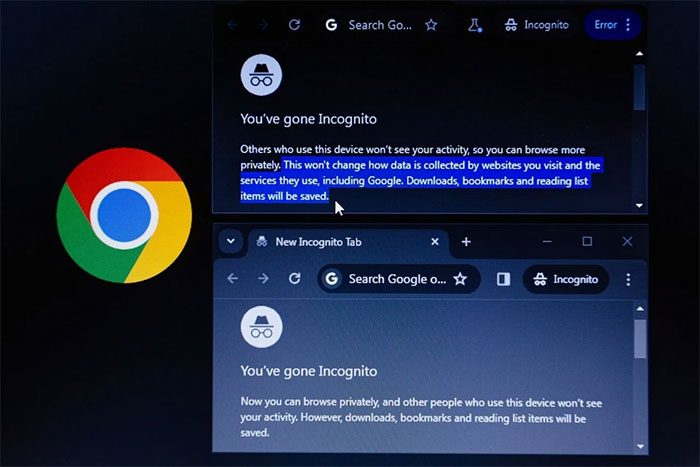To resolve a long-standing lawsuit, Google has agreed to delete “billions of data records” collected from users while in Incognito Mode. This sheds light on misconceptions surrounding Chrome.
If you still believe that Google Chrome’s Incognito Mode is the best way to protect your privacy on the Internet, now is the time to reconsider.
Google has agreed to delete “billions of data records” that the company has collected over the years while users browse the web in Incognito Mode, according to documents filed in federal court in San Francisco on April 1.

The agreement stipulates that Google must clarify: Incognito Mode is not as anonymous as many believe. (Photo: WSJ).
This agreement has brought to light Google’s secretive practices and the amount of data the tech giant collects from users, even when they are in private browsing mode.
Filed in 2020, the class-action lawsuit accused Google of misleading users about how Chrome tracks their web browsing activities in Incognito Mode. The lawsuit alleged that Google’s privacy and marketing disclosures did not accurately inform users about the types of data being collected, including details about the websites they visited.
Under the terms of the agreement, Google must update the splash page that appears whenever users open a Chrome window in Incognito Mode. This page must clearly state that Google collects data from third-party websites “regardless of which browser or browsing mode you are using.”
Additionally, the company must mention that “third-party websites and applications that integrate services may still share information with Google.” Detailed information about Google’s collection of private browsing data must also be included in the company’s privacy policy.
Furthermore, some data that Google previously collected from anonymous users will be deleted. This includes “private browsing data older than 9 months” from the date Google signs the agreement, as well as private browsing data collected throughout December 2023.

The amount of data Google must delete is unprecedented. (Photo: Shutterstock).
However, some documents in the lawsuit referenced Google’s data collection methods that remain undisclosed, making it challenging to assess the comprehensiveness of the data deletion process, Wired noted.
Attorney David Boies, representing the users, stated that this agreement requires Google to delete and remediate the amount of unlawfully collected data “on an unprecedented scale and scope.” “This agreement is a historic step in demanding honesty and accountability from the dominant tech companies,” the attorney told the Wall Street Journal.
A Google representative, Jose Castaneda, stated the company is “more than willing to delete old data.” These have never been linked to an individual and have never been used for any form of personalization. Castaneda also noted that the company would not face fines under the mentioned agreement, after having previously faced a $5 billion penalty.
The agreement also outlines several tasks Google must undertake, including continuing to “block third-party cookies in Incognito Mode for 5 years,” encrypting part of the IP address to prevent the identification of anonymous user data, and deleting certain header information that could potentially be used to identify users.
Previously, critics of Incognito Mode argued that Google’s protective measures have become ineffective against the complex user-tracking tactics employed by companies today. The worst part is that this feature gives people a false sense of security, allowing companies like Google to passively monitor millions of users. They have been misled into thinking they are browsing the web alone.


















































